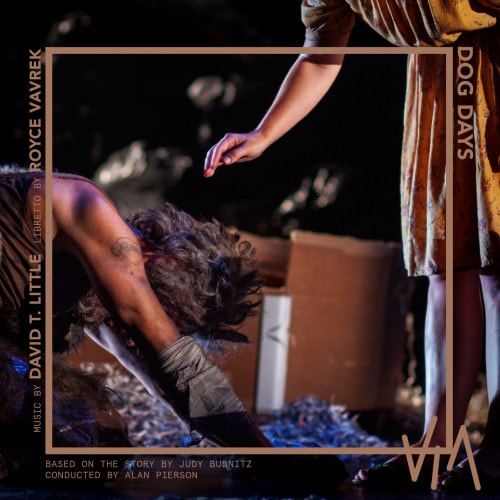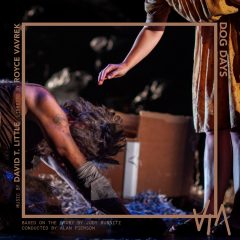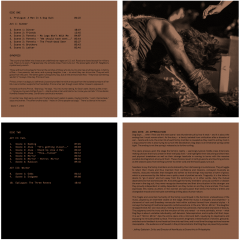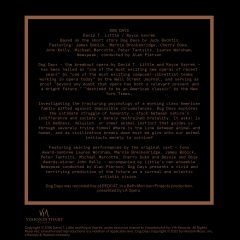Dog Days (2012) 120'
opera in three acts
6 singers, 1 actor and amplified chamber ensemble 2S,M,2T,Bar,actor; cl(=bcl)-perc(2)-pft-elec.git-vln-vla-vcl-db
libretto by Royce Vavrek after the short story by Judy Budnitz
Commissioned by Peak Performances @ Monctlair (Scenes from Dog Days [2009] commissioned by Carnegie Hall through The Weill Music Institute)
Inquiry:
David T. Little
Dog Days
To rent this score, please place your order through the Boosey & Hawkes rental system:
For questions and help with rentals, contact Boosey & Hawkes at usrental@boosey.com.
Recording Info:
David T. Little
Dog Days
For perusal scores and more information, please contact Boosey & Hawkes at composers.us@boosey.com
After the closure of National Sawdust Tracks, this recording was re-released on Bright Shiny Things. That edition is available here.
+ + + + +
DOG DAYS
an opera in three acts
Music by DAVID T. LITTLE
Libretto by ROYCE VAVREK
Based on the short story Dog Days by JUDY BUDNITZ
CAST and MUSICIANS
(in alphabetical order)
JAMES BOBICK – Howard (Father)
MARNIE BRECKENRIDGE – Mother
CHERRY DUKE – Captain
JOHN KELLY – Prince
MICHAEL MARCOTTE – Elliott
PETER TANTSITS – Pat
LAUREN WORSHAM – Lisa
Newspeak
JAMES JOHNSTON – piano, synthesizer
TAYLOR LEVINE – guitar
EILEEN MACK – clarinets
COURTNEY ORLANDO – violin
KRIS SAEBO – bass
NATHAN SCHRAM – viola
BRIAN SNOW – cello
PETER WISE – percussion
MOLLY YEH – percussion
ALAN PIERSON – conductor
The country has fallen into chaos as an undefined war rages on U.S. soil. Roads are closed except for military use. There is no work. Progressively, the schools close. Food runs out. The power gets shut off. Neighbors mysteriously vanish. Those without homes beg for food at the porches of those who do, but no one has anything to give.
A family of five — two parents, two sons, and a young daughter, Lisa — do what they can to survive. They eat wild grass from the yard. The father goes hunting every day, but all the animals have fled. “They know something we don’t,” he says. One day, Prince arrives.
Prince, a man in a dog suit, befriends Lisa and provides her with an escape from the isolated boredom of her life. Lisa’s mother supports this friendship. Prince is her pet, though Lisa’s father, Howard, opposes it. Howard confronts Prince. “Stand up,” he says. “You’re a human being, for God’s sake. Stand up like a man. . . I’ll give you my own clothes if you’ll . . . stand up like a man and talk to me. I know you can talk.”Prince barks; Howard chases him away. Conditions continue to worsen. It’s winter now. Dark early, and cold. The family hasn’t eaten in weeks, maybe months. “I wish I had a steak,” says one brother. The other brother adds “I heard in China people eat dogs.” There is silence in the room.
DOG DAYS: AN APPRECIATION
Dog Days . . . when I first saw this new opera I was thunderstruck by how it ends – and it is about the ending that I must remain silent. As the story — a family isolated from civilization after a disaster of war — twists and curls, the inner life of each family member is revealed as they react to a stray man in a dog costume who is also trying to survive the devastation; Dog Days is an emotional spring coiled tight. The ending is not the spring’s release but a further coiling.The opera presses upon the stage the family’s reality — seemingly typical middle-class Americans making choices that try to preserve their everyday lives — and highlights their disturbing ordinariness and physical breakdown as well as their strange lassitude in coming to terms with the massive societal disintegration all around them. These choices result in both gruesome and touching actions as the seasons pass from stifling summer to winter cold and the food supply runs out. Needless to say the family members are brutalized by their distressing circumstances. They struggle to retain their rituals and thus maintain their confidence and illusions, conveyed musically as metallic, staccato melodies that elongate and soften so that strings may express a hymn of grace, which is pronounced by the father over a paltry meal of pickled carrots.
Tragically, it is the father’s desire to “go it alone” and turn away from the community, or in other words, deny the mutual dependencies that domesticate life. And although the family members variously comfort or disdain the man in the dog suit, they never recognize themselves and their dire situation in this stranger: are they proudly independent or safely dependent; are they human or are they mere animals. The music expresses this reality as jitters in the clarinet and percussion that stress the family’s brittle and changeable moods and insinuate something chilling about human nature.This fragile and uncertain humanity of the family is portrayed in the harmonic unsteadiness of the music, played by an ensemble visible on the stage. While the music is energetic and amplified — a cloisonné of rock and Broadway vernacular held within outlines formed from classical styles — it conveys the feeling of traditional operatic recitative and aria. In the aria “Mirror, Mirror,” the daughter misapprehends her own starvation, feeling that she has achieved a fashionable standard of beauty.The poignancy and the irony and the revulsion of this aria reveal — or more pointedly, mirror — what Dog Days is about: unstable individuality, self-delusion, false aspiration, and in spite of all that, hope. It is as if “Mirror, Mirror” dips the entire opera into a mild acid bath, liquefying its daydreams and exposing its intricate pitted surface. The final scene’s enigmatic intensification of drones, glissandi, and electronic feedback turns theatrical time into real time, and in real time the stage actions become inescapable – the audience is left awash in the primal emotions that Dog Days so powerfully evokes.
—Jeffrey Edelstein, Critic and Director of New Music at Crane Arts in Philadelphia
Produced by David T. Little and Alan Pierson
Recorded on location by Nick Tipp at REDCAT, Los Angeles
Edited and Mixed by Andrew McKenna Lee at Still Sound Audio, Brooklyn NY
Mastered by Joe Lambert
Cover photo by James Daniel
Natalia Schwien, VIA Records Label Director
Mogollon, Album Design
Dog Days was recorded live in performance at REDCAT, June 11-15, 2015,
in a Beth Morrison Projects production, presented by LA Opera.
Dog Days was originally produced in 2012 by Peak Performances at Montclair State University, under the auspices of The Office of Arts & Cultural Programming, Executive Director, Jedediah Wheeler, with special acknowledgement to Jill Dombrowski and J. Ryan Graves, in association with Beth Morrison Projects. The World Premiere performance was presented on September 29, 2012 at The Alexander Kasser Theater.
Dog Days was commissioned by Peak Performances at Montclair State University (NJ). Selections from Dog Days were commissioned and presented by Carnegie Hall for the Weill Music Institute. Scenes from Dog Days were presented as part of New York City Opera’s VOX Contemporary American Opera Lab
The 2015 tour of Dog Days was produced by Beth Morrison Projects.
Additional support for libretto publication provided by Kiki and David Gindler.
Published by Hendon Music, Inc., a Boosey & Hawkes Company



